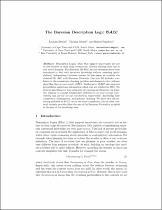JavaScript is disabled for your browser. Some features of this site may not work without it.
- ResearchSpace
- →
- Research Publications/Outputs
- →
- Conference Publications
- →
- View Item
| dc.contributor.author |
Botha, L

|
|
| dc.contributor.author |
Meyer, Thomas

|
|
| dc.contributor.author |
Penaloza, R

|
|
| dc.date.accessioned | 2019-03-25T14:07:22Z | |
| dc.date.available | 2019-03-25T14:07:22Z | |
| dc.date.issued | 2018-10 | |
| dc.identifier.citation | Botha, L. Meyer, T. and Penaloza, R. 2018. The Bayesian Description Logic BALC. DL 2018 - 31st International Workshop on Description Logics, Tempe, Arizona, 27-29 October 2018 | en_US |
| dc.identifier.uri | http://ceur-ws.org/Vol-2211/paper-09.pdf | |
| dc.identifier.uri | http://hdl.handle.net/10204/10848 | |
| dc.description | Paper presented at DL 2018 - 31st International Workshop on Description Logics, Tempe, Arizona, 27-29 October 2018 | en_US |
| dc.description.abstract | Description Logics (DLs) that support uncertainty are not as well studied as their crisp alternatives, thereby limiting their use in real world domains. The Bayesian DL BEL and its extensions have been introduced to deal with uncertain knowledge without assuming (probabilistic) independence between axioms. In this paper we combine the classical DL ALC with Bayesian Networks. Our new DL includes a solution to the consistency checking problem and changes to the tableaux algorithm that are not a part of BEL. Furthermore, BALC also supports probabilistic assertional information which was not studied for BEL. We present algorithms for four categories of reasoning problems for our logic; two versions of concept satisfiability (referred to as total concept satisfiability and partial concept satisfiability respectively), knowledge base consistency, subsumption, and instance checking. We show that all reasoning problems in BALC are in the same complexity class as their classical variants, provided that the size of the Bayesian Network is included in the size of the knowledge base. | en_US |
| dc.language.iso | en | en_US |
| dc.relation.ispartofseries | Worklist;22165 | |
| dc.subject | Bayesian Description Logic | en_US |
| dc.subject | BALC | en_US |
| dc.subject | Bayesian networks | en_US |
| dc.title | The Bayesian Description Logic BALC | en_US |
| dc.type | Conference Presentation | en_US |
| dc.identifier.apacitation | Botha, L., Meyer, T., & Penaloza, R. (2018). The Bayesian Description Logic BALC. http://hdl.handle.net/10204/10848 | en_ZA |
| dc.identifier.chicagocitation | Botha, L, Thomas Meyer, and R Penaloza. "The Bayesian Description Logic BALC." (2018): http://hdl.handle.net/10204/10848 | en_ZA |
| dc.identifier.vancouvercitation | Botha L, Meyer T, Penaloza R, The Bayesian Description Logic BALC; 2018. http://hdl.handle.net/10204/10848 . | en_ZA |
| dc.identifier.ris | TY - Conference Presentation AU - Botha, L AU - Meyer, Thomas AU - Penaloza, R AB - Description Logics (DLs) that support uncertainty are not as well studied as their crisp alternatives, thereby limiting their use in real world domains. The Bayesian DL BEL and its extensions have been introduced to deal with uncertain knowledge without assuming (probabilistic) independence between axioms. In this paper we combine the classical DL ALC with Bayesian Networks. Our new DL includes a solution to the consistency checking problem and changes to the tableaux algorithm that are not a part of BEL. Furthermore, BALC also supports probabilistic assertional information which was not studied for BEL. We present algorithms for four categories of reasoning problems for our logic; two versions of concept satisfiability (referred to as total concept satisfiability and partial concept satisfiability respectively), knowledge base consistency, subsumption, and instance checking. We show that all reasoning problems in BALC are in the same complexity class as their classical variants, provided that the size of the Bayesian Network is included in the size of the knowledge base. DA - 2018-10 DB - ResearchSpace DP - CSIR KW - Bayesian Description Logic KW - BALC KW - Bayesian networks LK - https://researchspace.csir.co.za PY - 2018 T1 - The Bayesian Description Logic BALC TI - The Bayesian Description Logic BALC UR - http://hdl.handle.net/10204/10848 ER - | en_ZA |






